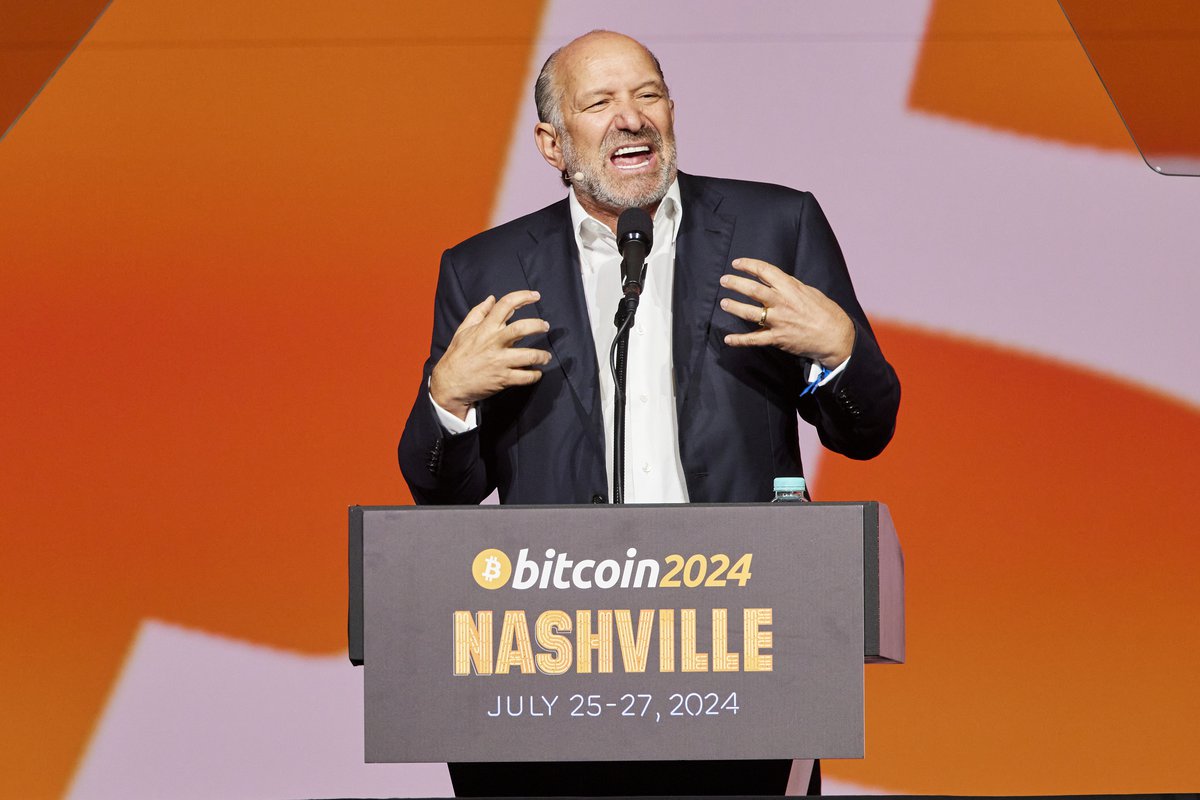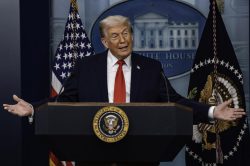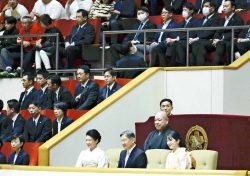
Howard Lutnick, chief executive of Cantor Fitzgerald, speaks at a 2024 bitcoin conference in Nashville in July.
17:03 JST, November 20, 2024
President-elect Donald Trump has tapped investment banker Howard Lutnick as his next commerce secretary.
Lutnick, the co-chair of Trump’s transition team, is the chairman and chief executive of financial services firm Cantor Fitzgerald. Trump announced the selection on his social media platform, Truth Social, on Tuesday, calling Lutnick “a dynamic force of Wall Street.”
As commerce secretary, Lutnick would play a leading role in implementing the president’s economic and trade agenda. The department oversees a broad array of federal policies, including on climate, semiconductors, cybersecurity and patents. If confirmed, Lutnick would have considerable influence over the trajectory of the U.S. economy over the next four years, responsible for executing some of the promises central to Trump’s 2024 campaign.
Lutnick had been a serious contender for treasury secretary, buoyed by Elon Musk in a Saturday post on X, the social network Musk owns and runs. Musk suggested that Lutnick would be a better choice for treasury secretary than one of the other top contenders, hedge fund executive Scott Bessent.
During Trump’s first term, the Commerce Department placed sweeping tariffs on steel and aluminum, and it blocked Chinese telecom giant Huawei Technologies from using American technology and software. The Biden administration mostly continued those policies, and the president-elect is said to be planning even tougher measures to curtail China’s tech boom. Trump has promised stiff tariffs of at least 10 percent on all imports and 60 percent for Chinese goods, some of which could fall under Commerce Department purview.
“The focus is going to be predominantly China,” said Nazak Nikakhtar, a former Trump Commerce Department assistant secretary who is now a partner at the law firm Wiley. “There is a real sense of urgency there. Commerce has to make the economy grow, and part of that is to make sure we’re able to run faster than our adversaries.”
Commerce has a wide-ranging purview that includes semiconductor research, export controls and artificial intelligence, as well as coastal fisheries and patents. It oversees the Census Bureau, the National Weather Service, and the National Oceanic and Atmospheric Administration. The job would also include a fair deal of promotion, drumming up American manufacturing and selling U.S.-made goods to other countries.
“Most secretaries of commerce become known for leading large trade missions – getting a bunch of CEOs on a plane that says ‘The United States of America’ and going abroad to make deals,” said William Reinsch, a senior adviser at the Center for Strategic and International Studies, who spent seven years as a Commerce Department undersecretary during the Clinton and George W. Bush administrations. “It’s a way to demonstrate U.S. economic influence and importance.”
Also included in the commerce secretary’s portfolio: oversight of government climate change research and weather observation, including key troves of data on the rise of greenhouse gases in the atmosphere and average global temperatures. Carbon dioxide concentrations are rising faster than at any other time in human history, the data show, acting like a blanket that is sending average global temperatures to new records year after year.
During Trump’s first term, scientists at NOAA, the Weather Service and other agencies raised concerns about the administration minimizing their work and compromising the integrity of their research.
In a September interview with Fox Business, Lutnick suggested that climate change is a concern only of the “elitist” and the rich, including those who attend Ivy League schools, live on the East Coast and are “pro-Palestinian.”
“You want to see real America, where real people are workers?” he asked. “Go to the Alabama-Georgia game.” There, he said, people were not talking about climate change but rather, “my parents need a job. They need manufacturing jobs, and that’s what Donald Trump is bringing.”
In addition to running Cantor Fitzgerald, Lutnick is chairman and chief executive of investment firm BGC Group and executive chairman of real estate brokerage Newmark Group. He has donated more than $6 million to super PACs supporting Trump’s reelection, federal filings show, and once appeared on Trump’s NBC reality show, “The Apprentice.” He shared the stage with Trump at events in the closing days of his campaign, including the rally at Madison Square Garden in New York.
Lutnick is also a supporter of the cryptocurrency Tether, a stablecoin whose value is tied to the U.S. dollar. In media interviews leading up to the election, Lutnick repeatedly plugged Tether, for which he said he manages some financial holdings.
“There’s a company that I like. It’s called Tether,” Lutnick told Bloomberg News in January. “I manage many, many of their assets,” he added.
The specifics of how he manages Tether’s assets are unclear. He declined through a bank spokeswoman to comment on his ties to Tether last weekend.
If Lutnick does move to the Commerce Department, he would probably have to unwind his considerable financial assets, because incoming Cabinet officials are often directed by the Office of Government Ethics to sell or divest themselves of assets that could pose conflicts of interest or the appearance of one. The Trump transition also committed to a code of ethical conduct, which requires members to remove themselves from involvement “in any particular Transition matter” that to their knowledge “may directly conflict with a financial interest” of theirs.
Lutnick’s ties to Tether also reflect the broader alliance between the crypto industry and many other figures whom Trump is expected to tap for important government positions in his second administration. Trump has repeatedly boasted of his support from the industry, which now has extensive ties to members of both parties.
Top Articles in News Services
-

Prudential Life Expected to Face Inspection over Fraud
-

South Korea Prosecutor Seeks Death Penalty for Ex-President Yoon over Martial Law (Update)
-

Trump Names Former Federal Reserve Governor Warsh as the Next Fed Chair, Replacing Powell
-

Suzuki Overtakes Nissan as Japan’s Third‑Largest Automaker in 2025
-

Japan’s Nikkei Stock Average Alls from Record as Tech Shares Retreat; Topix Rises (UPDATE 1)
JN ACCESS RANKING
-

Univ. in Japan, Tokyo-Based Startup to Develop Satellite for Disaster Prevention Measures, Bears
-

JAL, ANA Cancel Flights During 3-day Holiday Weekend due to Blizzard
-

Japan Institute to Use Domestic Commercial Optical Lattice Clock to Set Japan Standard Time
-

China Eyes Rare Earth Foothold in Malaysia to Maintain Dominance, Counter Japan, U.S.
-

Japan, Qatar Ministers Agree on Need for Stable Energy Supplies; Motegi, Qatari Prime Minister Al-Thani Affirm Commitment to Cooperation


























